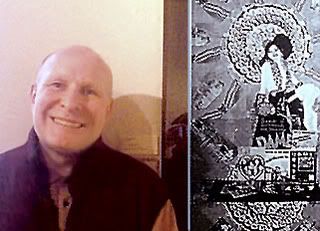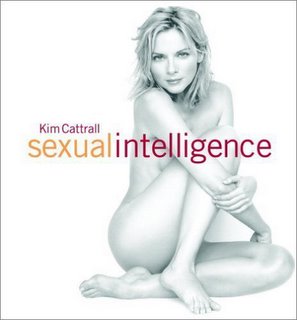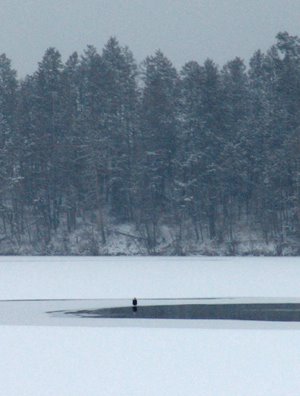Wildlife: THREE Bald eagles staking out the aereation pond on Middle Foy's Lake -- a small white-headed Bald Eagle sometimes sits there too.
NEW Web Site:
Theater X-Net
Featuring: Ida Rubinstein Belle Epoch Russian/Parisian beauty.

Visit: Michael's Montana Web ArchiveTheater, Art, Flash Gordon, Funky Music and MORE!Weather: Intermittent skiffs of snowfall and low temperatures the last few days. It got down to 5 degrees (F) on Sunday morning.
Charity Alert: Stay inside and click on
The Hunger Site -- warm up your feet AND your heart!
In The Community: Just about 600 people visited the Hockaday Museum during Friday night's
Art Walk! It was a beautiful, but chilly night -- it was sublimating snow one second to the next. That's a chemical term for jumping from one state (humid) to another (snow) without going through the intermediate step (rain). A nearby framing shop was giving away shots of whiskey to Art-walkers in order to ward off the chill -- it was pretty easy to uh -- see, who visited there!
Hockaday Museum of ArtI missed the annual Christmas party for Flathead Valley Community College employees, but I delivered and picked up a follow-spot used for the "entertainment." Everyone seemed to have had a real good time.
Media Watch: Some of my adolescent vices are gaining respectability -- Severely condensed from Carly Berwick's article "Why Have There Been No Great Women Comic-Book Artists?" in
Arts and Letters Daily.
(Note: The Museum of Comic and Cartoon Art (MOCCA) in New York will mount an all-female exhibition called "She Draws Comics" from May through September 2006):
In case anyone still doubted it, comics are now officially an art form, with the opening this month of Masters of American Comics in Los Angeles. The first exhibition in an American art museum to set forth a canon of graphic masters, it is on display at the Museum of Contemporary Art and the University of California's Hammer Museum from the 20th of November 2005 to March 12, 2006. The 15 masters, selected by independent curators John Carlin and Brian Walker with input from Art Spiegelman, include: (click each link for examples)
Lyonel Feininger (The Kin-der-Kids)
George Herriman (Krazy Kat)
Winsor McCay (Little Nemo)
Milton Caniff (Terry and the Pirates, Steve Canyon)
Charles Schulz (Peanuts)
Jack Kirby (Fantastic Four, X-Men)
Harvey Kurtzman (MAD, Little Annie Fannie)
Robert Crumb (ZAP, Weirdo, etc.)
Art Spiegelman (Maus)
Chris Ware (Jimmy Corrigan: The Smartest Kid on Earth)
Gary Panter (Jimbo)
MY take on the matter -- Feininger became a successful and popular "Modern" studio artist, but he only had tangental influence on Comics as an artistic field.
Kin-der-Kids was ambitious, but it was also a commercial flop, and not that many people saw it.
Winsor McCay succeeded commercially where Feininger failed, and created some of Comics' finest works before WWI.
George Herriman's bold and beautiful drawings may be an acquired taste, but once you acquire that taste there is a whole world of intoxicating pleasure in front of you, and an emotional resonance that is rare in any art. Milton Caniff created adventurous "movies on paper" in a dramatic chiaroscuro style that partook of both photography and cartooning. Charles Schulz entertained the world with a poignancy that was never mawkish or sentimental.
Kurtzman created MAD, but he moved on, partly but not completely of his own will. His creation thrived in the hands of Al Feldstein, Bill Gaines, Mort Drucker, Don Martin, Dave Berg, Al Jaffee, and the "Usual Gang of Idiots" who followed his tenure. Good as they were, they never surpassed Kutzman's collaborations with Wallace Wood, Joe Orlando, Bill Elder, or Jack Davis. I must say that Kurtzman and Elder, his long-time partner, never matched their best works in MAD again either. Congratulations to the brilliant editorship of Hugh Hefner for keeping this team in print over the subsequent decades.
I was lucky enough to meet Jack Kirby (Jakob Kurzenberg) and his wife Roz. They treated me warmly at their home whenever I visited Los Angeles. Jack was one of the major artistic forces in Comic Books from the early 1940's to the late 1970's. He and his partner Joe Simon helped write the rulebook for making this art form succeed financially. After that partnership broke up, he made a new alliance with the Marvel Comics Group, took on the well-established Superman/Batman team, and beat them at their own game with characters like
The Incredible Hulk, The Fantastic Four, The X-Men, and
The Avengers, in whose pages he revived his old creation
Captain America, Living Legend of WWII. He designed the whole look and style of Marvel Comics -- which enfolded other characters like
Spider Man and
Daredevil. He signed on with the DC (Superman) company again for several series of
New Gods comics in the early 70's -- they were critical successes, and their characters still have occasional revivals. Marvel brought him back again in the late 70's, but he wasn't able to save them from another of their occasional bankruptcies by himself -- even though his
Eternals series was first-rate. He fell out of favor with the fans during the 80's, but enjoyed a final burst of well-deserved fame and success with Topps Comics, a Marvel co-production, before his passing in 1993.
 My friend Jack Kirby gave me a signed copy of this portfolio when my theater group and I were slaving on the road in early 1975.
My friend Jack Kirby gave me a signed copy of this portfolio when my theater group and I were slaving on the road in early 1975.
His son Neal was the publisher, and I traded Jack some of my Mime Troupe posters in return.Robert Crumb embodies the word prolific -- even if you may not like what he does, or his attitudes, he has a work ethic and drive to create, which puts him in the foremost rank of Comic artists. ( Comix in his case.) I've met him, but it wasn't in any context where I could make friends. I would say he is a mirror of our society without hesitation -- so he's weird -- so's our society.
Art Spiegelman's biographical stories of WWII's Holocaust (Shoah) wouldn't have happened without Harvey Kurtzman, Robert Crumb, and Will Eisner (see below) leading the way. Spiegelman's acumen in publishing RAW Comics has also been a beacon to those of us who love progressive storytelling in pictures. Gary Panter (pronounced "Painter") not only was a stalwart for RAW Comics, but helped design the fabulous "Pee Wee's Playhouse" TV show. I am not familiar with Chris Ware's work, but I will rectify that situation.
E.C. Segar, Frank King, and Chester Gould weren't mentioned in the article, but I'm glad the creators of Popeye, Gasoline Alley, and Dick Tracy were included in the two museums' exhibits. There are still some serious omissions in this list, not to mention the foolishness of trying to establish a canon anyway. I suspect Ms. Berwick is being ironic in her use of the term, although these museums seem to be laughably straight-faced about it all.
Masters of American ComicsAlex Raymond belongs on ANY major list for his gorgeous work in creating
Flash Gordon, Jungle Jim, Agent X-9, and
Rip Kirby. Harold Foster's Sunday pages of
Tarzan and
Prince Valiant defined excellence for the Comics genre. Burne Hogarth's own exuberant
Tarzan was a triumph of inkwork and design. Will Eisner demonstrated that Caniff could be outdone for "movies on paper" in Comic Books. As far as deep humor and thought go in newspaper comics, Walt Kelly's
Pogo was a masterpiece. Eisner's disciple, Jules Fieffer is still able to match wits with any age's version of Jonathan Swift.
Other great practitioners besides the aforementioned include: Harold Gray (Li'l Orphan Annie), Reed Crandall, Al Capp (Li'l Abner), his ex-assistant Frank Frazetta, Steve Ditko (Spider Man, Dr. Strange), Frank Miller, Neal Adams, Gus Arriola (Gordo), C.C. Beck (Captain Marvel), Mac Raboy (Capt. Marvel Jr. and Flash Gordon), Joe Kubert, George Carlson, Russ Manning (another quality
Tarzan interpreter), John Severin, Rich Corben, Moebius, Alejandro Jodorosky (uh, oh -- some of 'em aren't Americans) ... I could go on, but we haven't even got to Japanese
Manga yet, and it's time to STOP!








